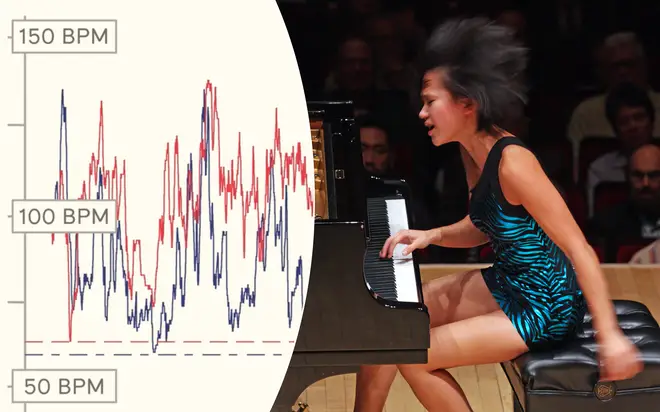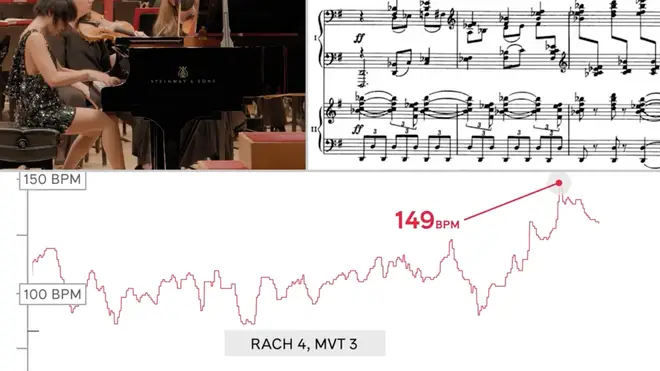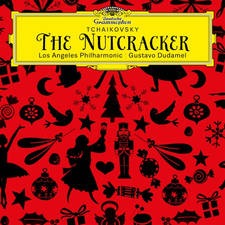Yuja Wang wore a heart rate monitor in Rachmaninov marathon, with astonishing results
4 April 2024, 17:03 | Updated: 5 April 2024, 15:58

Star pianist Yuja Wang wore a heart monitor during a 2.5-hour Rachmaninov marathon at Carnegie Hall, and the results are astounding.
Listen to this article
In January 2023, Yuja Wang undertook one of the greatest feats of classical music performance, in a two-and-a-half-hour concert at New York’s Carnegie Hall.
Together with conductor Yannick Nézet-Séguin and the Philadelphia Orchestra, Wang performed a devilish programme consisting of all four Rachmaninov piano concertos and the composer’s Rhapsody on a Theme of Paganini.
Throughout the marathon performance, Wang, Nézet-Séguin, and a selection of orchestra and audience members each wore a monitor on their wrist, which measured their heart rates over the duration of the concert.
Carnegie Hall has now released the results of the experiment, from highest and lowest heart rates to warming moments when the performers’ heart rates aligned.
Perhaps the most impressive outcome of the experiment is that Yuja Wang was able to identify particular moments in the music just from looking at her heart rate graph.
“The hardest moments in that variation are the jumps,” she commented, on her raised heart rate during Rachmaninov’s Rhapsody. “But it’s not physically hard, it’s just psychologically hard!”
Read more: Rachmaninov’s Piano Concerto No.2 crowned nation’s favourite for second year running

Yuja Wang, LA Phil, Gustavo Dudamel – Rachmaninoff: Piano Concerto No. 1: III. Allegro vivace
Somewhat unsurprisingly, Yuja Wang’s heart rate spiked most significantly during the concerto finales. “It goes higher when there are more notes,” the pianist estimated. “More notes or faster – or louder.”
Compared to the heart rate data this prediction was largely accurate, but not when it came to the number or notes she was playing.
In one notoriously fiendish section in the final movement of Rachmaninov’s Piano Concerto No.3, where the notes on the page are a dense forest of black ink, Wang’s heart rate was remarkably low at 85 beats per minute – just over 20 beats per minute above her resting heart rate.
Compare that with the finale of Rachmaninov’s fourth concerto, and Wang’s heart rate rockets to a rapid 149 beats per minute. That’s about the same pace as Bonnie Tyler’s ‘Holding Out for a Hero’. Intense.

Yuja Wang’s familiarity with the piece may well be at play here. She has performed Rachmaninov’s Piano Concerto No.3 a whopping 72 times. That’s twice as many times as she has played the eternally popular Piano Concerto No.2, with still fewer performances for the First and Fourth.
So perhaps any pre-performance nerves for Wang are calmed by confidence and expertise. It’s true that of all the concert’s music, Yuja Wang’s average heart rate was at its lowest throughout the Third, and she even said the piece “has a calming effect for me”.
Perhaps the most beautiful statistic to come from the study is the synchronisation of heart rate between conductor and soloist. Several moments in the concert showed both Wang and Nézet-Séguin’s beats per minute rising and falling together in perfect harmony.
Read more: New study finds audience heartbeats and breath rates synchronise during a classical concert

Tracking Yuja Wang’s Heartbeats During Her Rachmaninoff Marathon | Carnegie Hall
What’s more, their heart rates also coincided with those of the orchestra and audience members during one particularly touching moment in Wang’s cadenza during the Piano Concerto No.3.
“My entire life as a conductor is to bring people in sync,” Nézet-Séguin said. “That’s always my goal, but I never thought it would be reflected in heartbeats like this. I felt in that concert that Yuja and I were on the same wavelength. It’s very beautiful, I find it very moving.”
“That’s why we like to make music,” Wang added. “Your brain waves are really just thinking the same thoughts. It’s totally telepathic.”






















